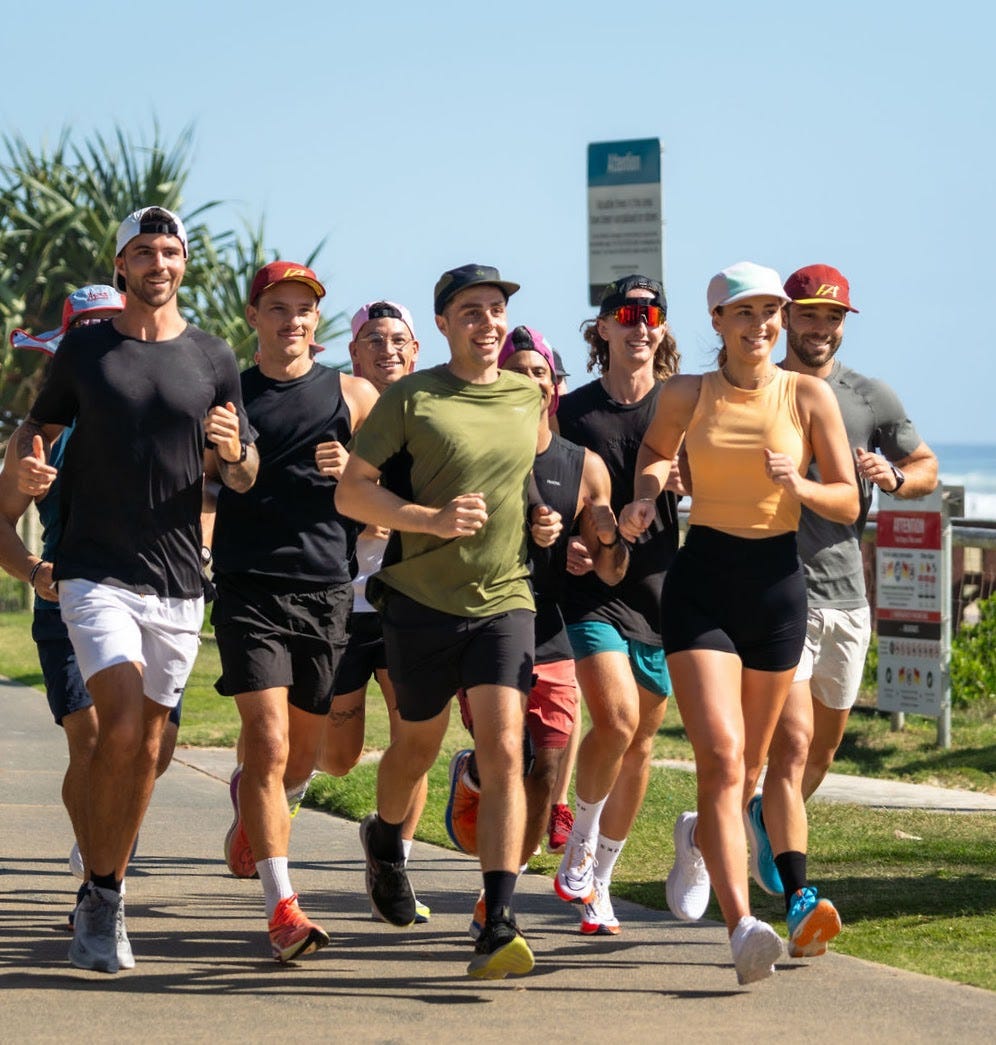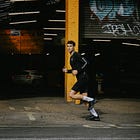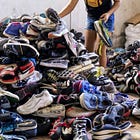Why we should expect more from running brands
We’re in a new age of conscious consumerism where the options available are as vast as they are varied. I speak to Matt Niutta of Fractel Running about using hats in the revolution
I’m a big fan of brands.
I don’t know if this is to do with being a Millennial, or just being a human living through this (everlasting) late-stage of capitalism, but I identify with brands.
I’m a Nike guy, for instance. Even though I lived through the unresolved sweatshop scandal of the ‘90s and the more recent scandals of reducing pregnant Olympians’ sponsorship deals (yes, plural), the incredible Just Do It-ness seeped indelibly into my brain. Now, seeing that dark Swoosh on my retro Nike Air Pegasus 83s (white) is the little dopamine hit I need whenever I pull them on.
I also firmly believe in conscious consumerism. For me, that involves:
Purchasing fewer items
Purchasing higher quality items
Purchasing from companies that reflect my views
All of us think about being that kind of consumer, don’t we? But have we all boycotted Nike? Even though we know all about the company’s unsavory acts? No. If anything, amateur/enthusiast runners still hold that dream of formally representing Nike. We would all love them to be a better company, but they’re inevitable; ubiquitous. I have a pair of Nike 5” inseam shorts from 2007. That’s 1 and 2 from my list covered, at least.
I’ve previously written about a couple of ‘better’ alternative, emerging brands in Hylo Athletics and Acid Running, that I believe are making the running sphere - and the world - a brighter place with their focus on green manufacturing and high-quality fashion-adjacent gear respectively (links below).

Today, I highlight Fractel - an Australian brand that creates high-quality running hats with a business focus on the Three Ps of Sustainability: People, Planet, and Profits.
P for People
The Fractel story officially started in 2018 when founder, Matt Niutta started an Instagram page as a way of “building the community, sharing stories of people within the community and why they run.” They were six months away from even having a product.
The real story started a few years earlier, however, back in 2011 when a 21-year-old Matt was diagnosed with retinitis pigmentosa - a degenerative eye condition. He was told that he would never be able to drive again, so his primary modes of transport became running and cycling.
Running wasn’t new to Matt, of course. He was a gifted high school cross country runner, and ran ultras before his diagnosis, but the importance of running in his life became increasingly important.
“It became a way to get from A to B, and also a way to meet and hang out with people. Once you’ve got a couple kids - like I do - and you’re running a business, you’ve only got X amount of hours in the day, so if you can catch up with your mates and go for a run at the same time, you’re killing two birds with one stone.”
After being diagnosed, running changed for Matt, and so did his idea of success. Long gone are the goals of trying to hit a time, now he’s medically blind, success “is simply surviving the run and hanging out with my mates.”
“I’ve constantly got to be hyper alert of where I'm running. I can barely see anything, so I typically only run in areas that I am familiar with now. Gone are the days where I would run on trails, which is sad. I love running on the trails, but the more technical it is, the slower I’m going to move through that. Just getting home in one piece, safe and sound is the most challenging part.”
So why hats?
“I live here on the Sunshine Coast of Australia, which is one of the hottest places in the world. You constantly need a hat on.”
So he made one. He had no aspirations to build a business at that point, but not only were hats front and center of your eyeline, Matt also “wanted to create a product that represented the reasons why [he] run[s].”
P for Planet
Building a business with best intentions for all from the beginning speaks to me. It’s difficult to even break even on a new business, but Fractel committed to donating 1% of their gross revenue ($1 million AUD in 2023) to wildlife and nature conservation in Australia (“A lot of our community use and abuse our trails every day, so we're trying to put back some of the money that we received to protect that.”). With 100% projected growth in 2024, that amount is set to rise proportionally.
As well as business-focused Three Ps of Sustainability, there are also the more people-focused Three Rs: ‘Reduce, Reuse, Recycle,’ and those are ones that I try to follow. Matt is painfully aware of them.
“Consumers will always consume - there's no two ways about it. Can we educate ourselves and other brands to do it more responsibly?”
“Creating products that people don't necessarily need, and contributing to waste in the larger scheme, doesn't sit well with us. The big focus moving forward is creating that circularity in product.”
“We're doing everything we can to use recycled fibers throughout our product, but there will come a time where you want to trade in or or reinvent your products. I’m sitting next to some samples where we’ve cut and sewn our old products into bags.”
It’s this constant thinking from the top of a business of how to do better as a company and as humans that gives me faith in Fractel, and the new wave of running apparel businesses that have popped up over the past decade. As runners, we spend more time outdoors than most, and we’re affected by weather more than most. We’re more acutely aware of the changes that are occurring. It makes sense that seeing a company that cares more deeply about the world is one to support.
From a business perspective, Matt wonders out loud how much people actually value the sustainability factor that he has sewn so purposefully and personally into his company.
“At the end of the day, it's our ethics and our morals from our own personal business perspective, isn't it? We'll put out what we feel is the right thing to put out and hopefully that attracts the right people.”
2023 reports from big business monitors such as Bain, Nielsen, and McKinsey say that two-thirds of consumers consider sustainability when making a purchase, and that they’ll pay a premium of at least 10%. They say that consumers want to identify with brands that share their values. The younger the consumer, the more intense all of these effects are.
Matt Niutta did not build Fractel or its values according to any deep dives on market data, and that’s exactly why the purity of purpose of the company shines through.
P for Profits
The organic growth of the company over the past six years has led to their current move. 50% of Fractel’s sales are in their home country of Australia, and a recent trip to the US highlighted how much more of the world there is to conquer.
After clearing a million bucks in revenue last year, I spoke to Matt the day after they launched a funding drive. 750,000 AUD of equity in the company was up for sale to Aussies interested in investing in a company with a bright future and an exciting vision.

With basic rewards like 10% off for life and future rewards like dividends within five years and a possible exit in case of a sale, the funding round was a success, with 400 new shareholders buying in from within their community.
“Products are more often than not sold out, so we’re just trying to keep more of our best-selling styles in stock. It’s a very exciting time to be in the running space. When we started five years ago, it was pretty strong, but in the last 12 months, the club culture and the demographic shifting towards running… it's just a super exciting time.”
They’re on target with those increased revenue projections, and have distribution centers set up in both the USA and in Europe, so the best possible framework is in place to ensure success for Fractel, and as they grow and are increasingly able to implement sustainable practices, we will see the effects of that in our world. That’s how we want it to work.
In this context, it’s difficult to argue that Nike, a company making $22BN profit in 2023, can’t implement better working environments for its global employees (third-party contractors or American medalists), and put a thorough and real recycling program into place.
Once I can break the 40 years of world-class-marketing brainwashing that has led to my white Nike sneaker habit, I’ll personally be one step closer to purity of mind, but does it really matter when those holding the most power aren’t doing their bit?
In the meantime, let’s hope this new wave of conscious capitalist companies can claim their righteous share of the market and build a brighter new future.
The New Wave of Ethical Running Brands
If, like me, you’re trying to move more towards companies who haven’t needed to form an emergency DEI committee, here are a few to try:
Janji - they give 2% of revenue to clean water projects around the world and you can win a $50 gift card HERE every single week.
Acid Running - A London-based apparel company that has its roots in tailoring and its desires in creating the highest quality running gear with an edge.
Hylo Athletics - Another London-based company but they’ve made the greenest shoes around that also outperform all their competitors.
Please leave the name of your favorite ethical running apparel company in a comment! Or tell me about how you’re also a saddo who can’t quit Nike.
Running Sucks Haiku of the Week
The sun was up, bright
7am? No guarantee
Summer running’s here
Last summer was the first summer that I managed to maintain a regular running regimen throughout the hot Los Angeles summer. A mixture of a finally-settled schedule and a new understanding that morning running actually suits me better than evening running meant that I found my groove at long last.
Previously, I used to reach autumn less in shape than I wanted, and I’d then have to work my way back for a strong spring, but not this past year.
I’m looking forward to waking up at 5.30am a lot this summer… (The afternoon naps are worth it.) How do you deal with the running in hot weather where you are?
Housekeeping
BUY STUFF - Upgrade your subscription for JUST 60 cents / week OR tip a one-off $3 if you enjoyed reading this, OR buy a set of Running Sucks stickers! There are 3 cool ones, and you get THREE MONTHS of upgraded subscription included for FREE.
CONNECT - Did you know that if you got this newsletter as an email, you can reply to me directly from it? It’s fun talking on email. I like it, anyway. If not, follow me on Instagram.
Links & further reading
Fractel [Crowdfunder] [IG]
Sam Robinson’s Breakfast Club [Substack]
Consumer surveys [Bain] [Nielsen/McKinsey]
About conscious consumerism [Santander]
Nike vs pregnancy [NYT] [Yahoo] [NYT again]
Thanks for getting all the way down here!
- Raz x








I do love Fractel, but in regards to running shoes, the only truly ethical and sustainable brand I've come across is Veja. Norda too, because their shoes will last for years. At least in running. Veja takes into account the entire process of footwear production, from worker wages and housing and transportation, to sourcing materials in the same geographic area, and minimizing shipping. The dirty secret of all these "sustainable" brands is that they're sourcing materials from around the globe, building them in cheap factories in southeast Asia, shipping them via container ships from point to point and in many cases– airplanes (far less fuel efficient)– with poor quality that creates far more waste than they save. Because, let's face it– shoes just are not sustainable. I'm always highly skeptical whenever I hear of brands using sustainability in a tagline. Even Janji has cut its giving by 60% since they began. Why? Because 2% still makes you look good, but 5% eats into the profits.
I think it’s all become pretty gratuitous. In the early 00s we called it “greenwashing”. The most high quality product even produced with a carbon footprint relatively high compared to that of green products- is ultimately the greenest product. Longevity, longevity, longevity. I used to love wearing ciele, cool designs, comfortable on first wear, but found that the stuff just totally falls apart (aside from the hats actually)